Combating loneliness over the holidays

The festive season is typically a time to celebrate. However, for socially isolated seniors in communities across British Columbia, it can also lead to feeling disconnected. As we continue to experience the impacts of COVID-19, it is likely that many of us will feel lonelier than usual this holiday season. Seniors, especially those who live alone, are particularly susceptible to feeling socially isolated.
What you can do to support a senior who may be socially isolated
Whether they be family members or neighbours, we can all do our part to help the seniors in our lives feel connected over the holidays. Here are a few things to consider:
- Plan a festive virtual event. For best results, focus on an activity that will give family and friends the opportunity to connect over a shared experience. For example, host a virtual happy hour, games night or baking night. There is an increasing number of third-party companies offering to facilitate engaging events that can be done from your living room.
- Hold a virtual holiday movie night. There are several platforms – for example, Netflix Party – which allow you to watch a movie at the same time as a family member or friend. Pick a holiday favourite and watch it together. Consider safely dropping off snacks or sending a care package in advance.
- Schedule a phone call. If you or the person in your life is less comfortable with technology, schedule a phone call. Just catching up can be meaningful.
- Plan a meal together. Consider “sharing a meal,” by ordering from the same restaurant or cooking a similar dish.
- View Christmas lights…apart! Pick a route, take separate cars and enjoy the lights in your neighbourhood. You can discuss your favourite displays by phone afterward or use a hands-free cell phone to chat as you go.
- Exchange a favourite cookie recipe. Trade festive baking recipes, bake and discuss!
- Reflect on past holidays. Create an online photo album of favourite holiday memories and set up a time to go through them together virtually. If doing this online is not an option, consider creating a printed photo book. If you are planning to bring the photo album to a long-term care or assisted living home, call in advance.
What to do if you are feeling lonely
- Keep in contact with friends and family.
• Try to talk to at least one person from outside your household each day.
• Zoom, Skype and Facebook Messenger are just three online platforms seniors can use to video chat with friends and family. If your internet access is limited, connect by phone. Arranging a regular time to have a phone or video conversation with someone you miss can give you something to look forward to each day.
• Arrange a “drive-by visit” with a family member. You could have a family member park across the street and hold up signs or messages. Even without physical distance, it can be nice to see a loved one’s face. - Keep up with as many of your hobbies and passions as possible.
• Do you practice a religion? Although you cannot physically go to church, you can watch services online and still keep up your daily religious practices and prayers.
• If you used to go to a seniors’ centre for arts and crafts, get creative to see what you can do from home. You can order art supplies online, or ask a family member to place an order for you. Homemade crafts or goodies can make great gifts! - Keep moving your mind and body
• Exercise has many physical and mental benefits. If possible, go for a walk around your neighbourhood, walk around your house or practice low-impact yoga or stretching. Having someone to speak to about your goals can help you to keep accountable.
• It is crucial to keep your mind active as well. Perhaps now is the time to learn about a subject you’ve always wanted to learn about, like environmental science, philosophy or ancient literature. Consider engaging with a virtual learning buddy who is interested in a similar topic, or create a virtual book club.
When it’s more than lonely
For some older adults, loneliness can result in feelings of isolation and depression. Worries about contracting the virus can also result in anxiety. While mental health issues can emerge at any stage in a person’s lifetime, older adults who have had past experiences with mental health challenges are more at risk.
Common indications of depression are feeling hopeless, losing interest in activities, weight loss or gain, or problems sleeping. However, some people will experience physical symptoms such as aches and pains. Anxiety is usually described as prolonged feelings of fear, nervousness, or feeling restless or tense. It can also include intrusive or repetitive thoughts and physical symptoms such as sweating or shaking, gastrointestinal distress, or feeling dizzy. Some people with anxiety will experience anxiety attacks, often without warning. Older adults sometimes describe their experiences slightly differently than younger adults.
Here are some resources that can help:
Your family doctor: Begin by speaking to your family doctor or visiting a walk-in clinic. There are virtual options that are available to help you do this.
The Mental Health Support Line: Call the Mental Health Support Line at 310-6789 (no area code) for information about services in your area.
Local mental health programs: Find a local mental health centre or program at gov.bc.ca/mentalhealthor find your local Canadian Mental Health Association branch at www.cmha.bc.ca.
BC211: Contact a local senior’s support organization or group and ask for advice. You can search for organizations at bc211.ca.
The Seniors Distress Line: Seniors in British Columbia can also call 604-872-1234 for telephone support from a trained volunteer at the Crisis Centre on topics specific to older adults. Topics may include suicide, retirement, stress, relocation, loss of a loved one, physical or mental health issues, emotional support, or help to work through a problem. The Seniors Distress Line is available 24 hours a day, 7 days a week, and in up to 140 languages.
